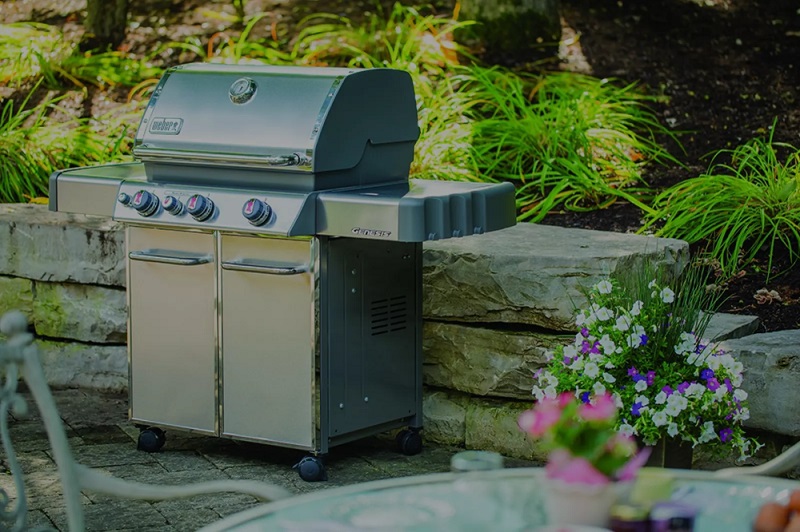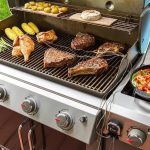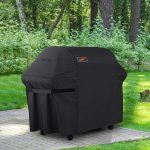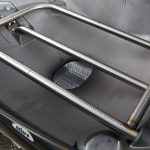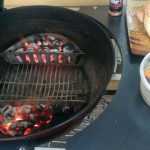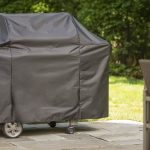Your Weber grill needs to be maintained to prevent rust from building up.
After all, your grill’s beauty will deteriorate if it’s covered with rust. You can preserve its luster by treating it with the appropriate rust prevention methods.
So, how do you keep weber grill from rusting? Weber grills are famous for their high-quality craftsmanship and sleek design.
They also don’t rust easily, which is a major selling point. However, they do rust.
This guide will teach you how to prevent rust on your Weber grill and prevent it from rusting in the future. First, you must clean your grill thoroughly.
Rust forms when water pools and splashes on your grill. This can be prevented by rinsing your grill after every use and cleaning it thoroughly once a week.
You should also clean the cooking grates thoroughly every few weeks. Rust forms when food particles become trapped on the grates and eventually burn onto them.
This can be prevented by cleaning the grates regularly. Finally, you should store your grill in a dry place and away from moisture.
This prevents rust from forming. If you follow these three steps, your Weber grill will be rust-free for years to come.
Contents [show]
Do Weber Grills Rust?
Yes, Weber grills rust, and it’s the same for Traeger grills as well.
In fact, most barbecues experience corrosion after several years’ worth of use. The materials used to make barbecues tend to be porous, making them susceptible to oxidation from water and air exposure.
After being exposed to these elements, the metals in your grilling equipment begin to corrode.
The condition worsens if the metals are not properly maintained or cleaned regularly.
If your barbecue is rusting heavily or has holes all over its surface, you need to repair it as soon as possible to prevent further damage.
Why Does Your Weber Grill Rust?
Extreme Heat Condition
Extremely high temperatures are one of the biggest causes of rust in a barbecue grill.
Iron mixes with oxygen to produce iron oxide when exposed to heat for long periods of time, which is the primary cause of corrosion.
Because rust is often created by the build-up of this iron oxide, it is most visible on grills that are exposed to extreme temperatures for prolonged periods of time.
Furthermore, intense heat conditions often cause grease and fat to accumulate on the cooking grates and in the burner tubes of the barbecue grill.
Rusting is also affected when water accumulates on the grill’s surface as a result of drippings falling from the food being cooked onto the surface of the barbecue grill.
Inadequate Storage
Moisture can accelerate the rusting of your grill if it is left outdoors for extended periods of time or if it gets wet frequently.
Moreover, excessive exposure to moisture can cause the surface of your grilling equipment to rot and develop mold and mildew on the surface.
Rusting on your grill is often caused by inadequate storage, improper cleaning or the use of low quality cleaning products.
As a result, the Weber grill should be stored indoors in a dry place out of direct sunlight and rain when not in use.
Extreme Humidity and Moisture
The rusting process of your grill can be accelerated by extreme humidity and moisture.
Corrosion is sometimes aided by the presence of steam or water vapour in the air around the appliance, which accelerates the formation of iron oxide on the surface of the iron pieces making up the grilling equipment.
Thus, it is best to store your barbeque in an indoor environment that is well ventilated and dry at all times.
Exposure to humid environments can accelerate the process of corrosion on metal surfaces in your grilling equipment.
Therefore, it is best to store your appliance indoors or in a well-ventilated garage where excess moisture or condensation is prevented from forming and rusting on the metal surfaces of your barbeque.
There may be some water vapour that forms naturally inside the griller, but as long as it evaporates quickly there should not be any effect on the exterior surface of your barbeque.
Due to the excessive humidity and moisture, rain or snow is not advisable for cleaning your outdoor cooking appliance as this may stain the exterior and damage the metal parts.
Extreme humidity and moisture in colder climates may also cause rust to form on metal surfaces and cause irreparable damage to your Weber product.
How to Keep Weber Grill from Rusting
Utilize Rust Remover
Using a dependable rust remover to get rid of any existing corrosion on the external surface of the griller.
You may certainly use metal rust removers or commercially available chemicals to remove existing surface layers of rusted material from the barbecue exterior.
However, it is important to ensure that the substances do not react with other metals present in the structure of the barbecue, as this may cause additional damage.
It is generally recommended that you avoid such products as they may harm the exterior finish of the unit and lead to further deterioration of the materials that make up the structure.
They will clean and treat the outer surface only and may leave the underlying structures exposed and vulnerable to further damage.
The grill cleansers are acidic solutions that may cause damage to metal surfaces if left on for too long, while certain chemicals such as acetone or turpentine are flammable and may ignite when exposed to heat from the heating elements.
Make use of Grill Grate Cleaners
Grill grate cleaning solutions from manufacturers like Weber or Broil King will help remove grease and dirt buildup from your barbecue grill grates without damaging your cooking surface.
Spray the cleanser on the grates, let sit for a few minutes and then scrub with a stiff wire brush before rinsing off with water.
Wipe away the excess water with a paper towel and wipe dry before firing up the grill.
However, if you still detect any rust markings, you can rub them with an abrasive pad made of steel wool or an emery cloth until the marks are gone.
Drain the Drip Tray
Hopefully, you’re aware that your barbecue grill comes equipped with a drip tray that’s meant to catch drippings from the meat you’re grilling.
This is something you absolutely need to do on a regular basis, otherwise you’ll have grease buildup that will clog up your system and cause fires.
It’s time to drain it and clean it out when the water inside is brown or dark in color.
You should double-check your owner’s manual to see what type of liquid is appropriate for cleaning the drip tray, as some are dishwasher safe while others are not.
If this fills with water and overflows while you’re cooking, turn off the gas immediately and turn off the ignition valve on the grill as well to prevent gas leaks.
Oil Coat the Surface
Another way to keep your Weber grill from rusting is to coat its surface with oil using an oil cloth.
This may protect the outside finish from getting rusty and prevent water from seeping into the internal structures of the appliance.
You can use mineral oil for this purpose, but make sure it doesn’t come into contact with the food that you’re preparing on it.
You should also avoid using oils that contain silicone or other petroleum-based materials. These can degrade over time and cause stains on your exterior finish.
This will provide a barrier that will prevent water and moisture from getting into the interior mechanisms of your grill, thus preventing rust and corrosion from occurring.
Furthermore, the oil coating will also add an attractive sheen to your stainless steel grates that will prevent them from looking dull and rusty over time.
Use a Wire Brush to Scrape the Surface
All you have to do to clean the surface is to use a wire brush to scrape off any grime and dirt that may be stuck on the surface.
To remove the rust off the metal grates, you can use steel wool or sandpaper to remove the layer of oxidation that is built up on the metal.
It is essential to scrape the grills with a wire brush to remove any loose pieces of rust or dirt to prevent scratching the surface with steel wool or sandpaper.
Remember to Clean It
Keeping up with frequent cleanings will ensure that your grill stays in good condition for longer and prevents it from rusting prematurely.
You should clean it at least once a week to prevent buildup of grease and other debris that may lead to corrosion.
Moreover, you should use a stainless steel cleaner at least once a month to keep the unit shining bright and prevent it from looking dirty.
You should also use a degreaser once every three months to remove stubborn stains from the surface of your griller.
Remember to clean your chimney on a regular basis too to prevent the buildup of soot and creosote that may damage your unit over time.
Every time you use the grill, make sure to scrape off any food residue from the grate and wash it with hot water before storing it away.
To remove the particles trapped between the grates, you can use a stiff wire brush to clean the grill thoroughly.
A strong metal brush may actually scratch the grates, so it’s better to use a soft bristled one instead.
How To Get Rid Of Rust On Weber Grills
Rust is a major problem for Weber grill owners.
It’s caused by water dripping onto the cooking grate of the grill. This water reacts with the metal of the cooking grate over time, leading to rust.
Luckily, it’s fairly easy to get rid of rust on your grill. First, you need to know what causes rust on your grill.
Second, you need to remove the rust from your grill. Finally, you need to repair and clean your grill to prevent the rust from coming back.
Also Read: Are Weber Grill Covers Machine Washable?
Conclusion
If you follow the preventative techniques I provided above, you should be able to keep your Weber Grill in tip-top shape for a long time. Remember, prevention is always better than cure.
You can always remedy rust if it hasn’t been an issue for too many years already. But you should always try to prevent it from happening in the first place.
If you want to get further into rust and corrosion control for your Weber Grill.
Still, take proper care of your Weber grill, it will reward you with many years of reliable performance.

